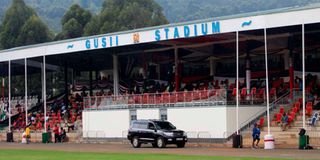Sports is soft target for legacy creation from labeling spree

A section of the main stand at Gusii Stadium on October 17, 2020.
What you need to know:
- Indian politicians, like their Kenyan counterparts, are engaging in legacy creation through labeling spree for political mileage. Sporting legends who deserve the honour are dying without recognition.
While we were engrossed in a debate as to whether it was right to rename Gusii Stadium Simeon Nyachae Stadium after the long-serving civil servant and politician who was buried on February 15 rather than renaming the stadium in honour of Kenya’s pioneer Olympian Nyantika Maiyoro, it appears that Indians have turned the corner on this one and disappeared into the horizon.
In the land of Mahatma Gandhi, the raging debate now is which (not if) politician deserves to have his name on the brim of the world’s largest cricket stadium.
On Wednesday, the newly renovated Sardar Patel Stadium (named after India’s first Deputy Prime Minister who played leading role in the country’s fight for independence, and guided its integration into a united country) hosted its first match. India beat England by 10 wickets in the third Test match at the facility in Ahmedabad.
The 110,000-seater facility is the largest cricket stadium in the world and is part of a sports complex spread over 63 acres of land. Controversy started on Wednesday morning before the match between India and England when the country’s president Ram Nath Kovind inaugurated the venue.
The name was suddenly changed to Narendra Modi Stadium, kicking up a storm in the world’s second most populous country. Prime Minister Narendra Modi has been accused of attempting to water down Patel’s contribution to India and renaming the stadium “to stay in the conversation especially with Indians below 35.”
The ruling party BJP has clarified that while the stadium had been renamed after Modi, the complex in which it is situated will be called the Sardar Patel Sports Enclave. I see another attempt here at legacy creation through labeling spree.
The folly of naming sports infrastructure over politicians is that contestations often tend to outlive the memory of the person we are seeking to preserve.
This is especially true in societies where politics is so divisive that for every action taken by those in power to appease loyalists, you have an equally large number of people in the population strongly opposed to it.
You might say that it is democracy in practice where the minority have their say but the majority have their say, but the noise from the contestation gets even louder when there is no agreement on the basis of arriving at the verdict.
So on the matter of which leader deserves to have public facilities such as sports stadiums named after them, you will have politicians tearing into each other like alley cats late into the night and washing dirty linen in public.
India is the world’s largest democracy, the second most populous country in the world after China, and the seventh largest country in the world by land area.
In sports, India has matched greatness by dominating the game of cricket and producing some of the best players to ever walk the surface of the earth. In the Indian Premier League (IPL), the country has the world’s most prestigious cricket league which is valued at US$5.3 billion (equivalent to Sh581 billion as per current exchange rates).
In a cricket-mad country such as India, shouldn’t the world’s biggest cricket stadium be named after one of its many cricket stars? Sachin Tendulkar Cricket Stadium named after the country’s greatest ever cricketer, or Sunil Gavaskar Stadium after the man regarded the greatest opening batsman of all time, and so on.
Indian politicians, like their Kenyan counterparts, are engaging in legacy creation through labeling spree for political mileage. Sporting legends who deserve the honour are dying without recognition.
Talk of renaming Bukhungu Stadium in Kakamega County after Kenya’s best known footballer Joe Kadenge has died down. Instead, plans are underway to rename a road full of potholes in Nairobi’s South C estate after him.





